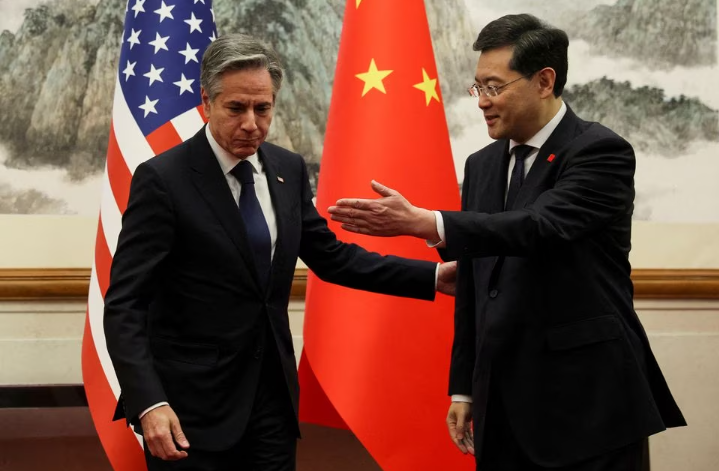U.S. Secretary of State Antony Blinken met with China’s top diplomat Wang Yi on Monday at the start of the second and final day of a rare visit to Beijing, aimed at ensuring that the many disagreements between the strategic rivals do not spiral into conflict.
The two top diplomats shook hands inside a red-carpeted hall at the Diaoyutai state guest house in Beijing, before moving into a meeting room with their delegations. They did not make any remarks beyond exchanging pleasantries.
All eyes will be on whether Blinken will also meet with Chinese President Xi Jinping later in the day, an engagement sources familiar with the matter said was expected but yet to be confirmed by the State Department.
Making the first visit to China by a U.S. secretary of state in five years, Blinken held more than 7-1/2 hours of “candid” and “constructive” talks with Chinese Foreign Minister Qin Gang on Sunday, although they did not appear to make concrete progress on the wide ranging disputes that include Taiwan, trade, human rights and stemming the flow of materials from China to the United States used in the production of fentanyl.
Both sides expressed a desire to stabilize bilateral ties despite what one U.S. official called their “profound” differences, and agreed that Qin would visit Washington to continue the conversation, though no date was announced.
“Despite very low expectations for any breakthroughs made during Blinken’s visit to China, there is still hope that both sides can maintain their ‘bottom line’ in the relationship,” state-run Chinese tabloid Global Times said in an editorial on Monday.
Briefing reporters late on Sunday, U.S. officials said there were no illusions that the issues would be solved with a few meetings but starting the conversations was an achievement.
“This is going to be a process of sustained diplomacy,” one senior State Department official, speaking on the condition of anonymity, said.
Blinken’s trip, which was postponed in February after a suspected Chinese spy balloon flew over U.S. airspace, is closely followed worldwide as further deterioration of ties between the world’s two largest economies could have global implications on financial markets, trade practices and routes and supply chains








